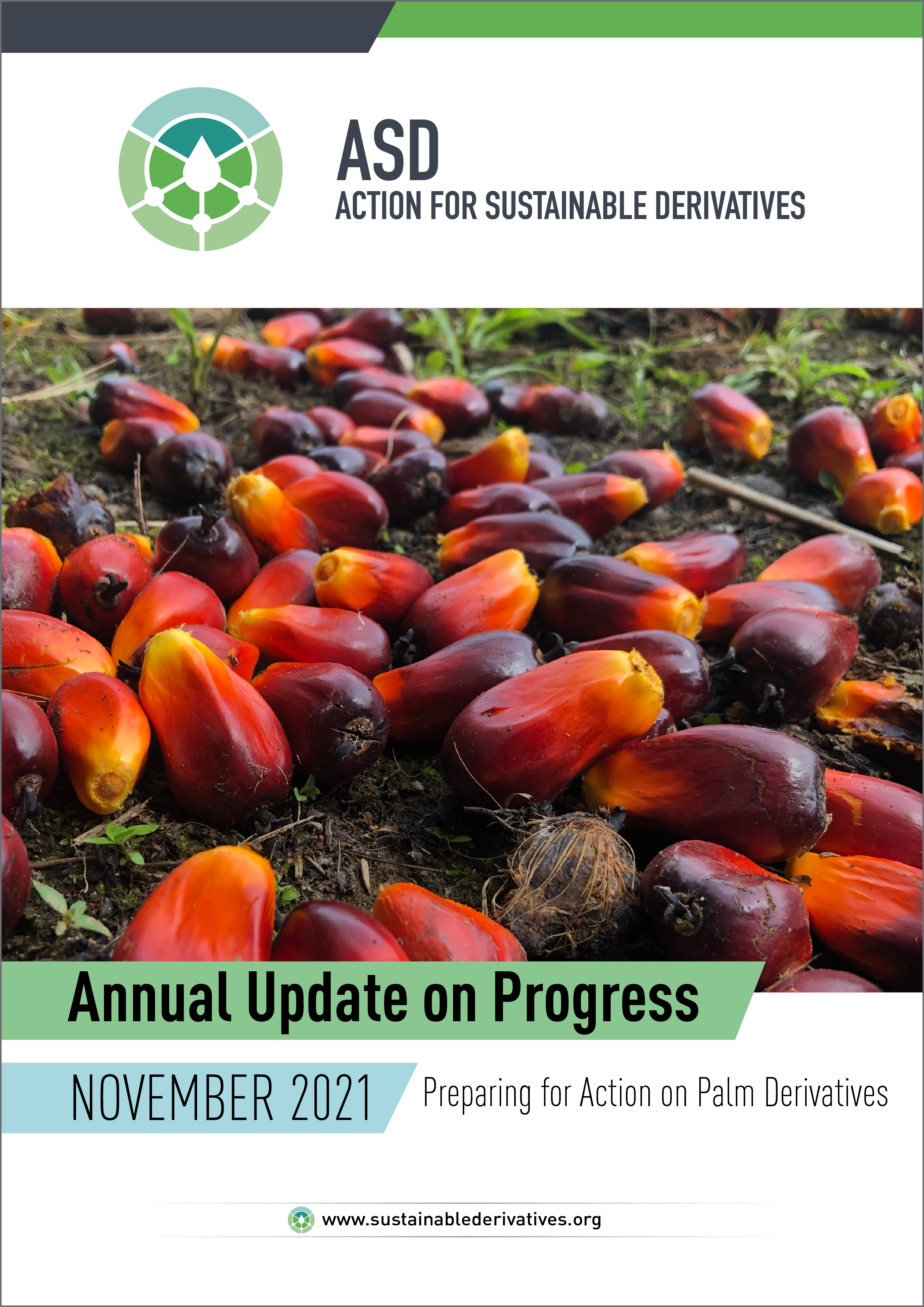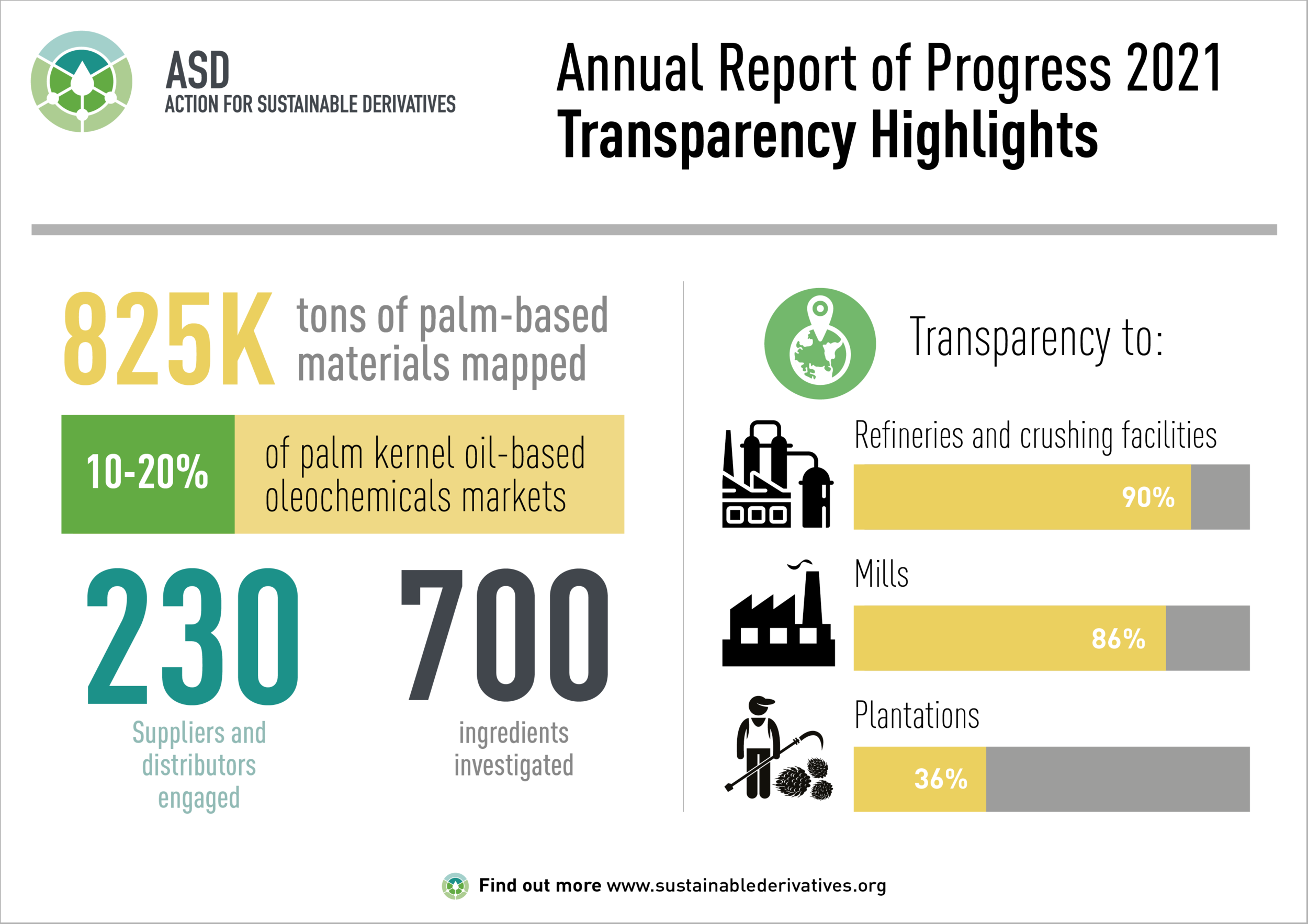Annual Update of Progress 2021
Members Communication Pack
What is the Annual Update of Progress 2021?
The ASD Annual Update of Progress is the “anchor” document to communicate the initiative’s progress to date and its future plans to external stakeholders and target companies for recruitment.
It serves as a source of core messaging and data disclosure agreed by ASD members, to be referenced by ASD members in corporate communications and reflected in wider ASD official communications collateral.
The report showcases ASD’s strong progress during its first two years and demonstrates leadership of Member companies.
The report will continue to serve as a key recruitment tool, essential for both ASD’s goal for market transformation and achieving our revenue targets.
More broadly the report serves ASD’s strategic communication objectives:
Engage the global derivatives supply chain to build stakeholder awareness, buy-in, and participation in ASD
Identify opportunities with wider sustainable palm industry players for alignment and collaboration on common challenges and solutions
What We’d Like Our Members To Do
The ASD Annual Update of Progress is now published on ASD’s new website and has been shared across the social media channels (LinkedIn, Twitter) of BSR, Transitions and individuals.
The ASD communications team will be targeting media outlets with the key messages of the report throughout November 2021.
But we also want ASD Members to leverage their networks and resources to amplify the key messages and statistics found within the report.
This may be via company websites, reports and forums, company social media channels and through key company influencers (e.g. CEOs, CSOs, COP, etc.)
To support you in this, you will find below:
suggested social media posts
supporting communications assets
the key messages
We thank you for your help.
Suggested Social Media Posts
The latest update from Action for Sustainable Derivatives (ASD), the collaborative initiative driven by palm oil derivatives users to transform their supply chains, shows that a centralized, collective approach to enhancing transparency, boosting engagement and identifying risks is working.
Highlights include collective transparency for 825,000 tons of palm-based materials –nearly double the volume covered during the first year of ASD. This represents around 1.1% of the global palm production and 20-25% of the palm kernel oil-based oleochemicals market.
You can find out more here: https://sustainablederivatives.org/our-impact
We're proud members of Action for Sustainable Derivatives – an industry-led collaboration aimed at achieving responsible production and sourcing of palm oil derivatives.
After two years working together, we have collectively achieved transparency to mills for 86% of the annual purchase volumes of 23 users of palm oil and palm kernel oil derivatives. This data has allowed for prioritization of supply chain players and production hotspots. And we have been able to develop an impact-oriented strategy to focus collective efforts of the beauty, personal care, healthcare, and olechemicals sectors to support responsible production practices and relevant conservation, restoration, and livelihood initiatives.
You can find out more by downloading the latest update report on the ASD’s progress: https://bit.ly/3Hb2F3C
A collective approach to enhancing transparency of palm derivative sourcing for cosmetics, home and personal care, healthcare, and oleochemicals industries is working. Check out the latest data to see how we are playing our role in transforming our palm oil supply chain https://bit.ly/3Hb2F3C
#Deforestation has been a key talking point during the COP26 discussions. That’s why we’re proud members of Action for Sustainable Derivatives which enables us to work with our peers to improve the way we source palm oil. Check out what we’ve achieved so far https://bit.ly/3Hb2F3C
We are proud members of #ASD, working with 23 (and growing) companies bringing together the collective voice of downstream users of palm derivatives. This year, we achieved 86% transparency to mills. You can see what else we’re working towards in the latest update on the collaboration: https://bit.ly/3Hb2F3C
Communications Assets
Key Messages
ASD communicated the key findings of the 2021 Annual Report of Progress during the stakeholder webinar held on 27 October 2021. You can find the presentation here.
To recap, the key messages to be aware of when communicating – whether in writing or speaking at events – are:
OVERALL
ASD is well prepared for action on palm derivatives.
Two years into its journey, ASD is proud to have made significant strides that have prepared the initiative to take action towards its vision, through its defined impact-oriented approach.
As ASD moves into its third year of operation with 23+ members, representing approximately one million tons of palm derivatives, the initiative plans to deploy joint actions to further progress the market towards responsible and sourcing of palm oil derivatives.
TRANSPARENCY
A centralized, collective approach to improving transparency works.
We achieved collective transparency for 825,000 tons of palm-based materials – nearly double the volume covered in year one.
This represents ~1% of the global palm production, ~8-10% of the global palm-based oleochemicals market (in terms of volumes), and 10-20% of the palm kernel oil-based oleochemicals market.
The total volume was sourced from 2,003 mills identified as potentially linked to ASD members’ collective supply chains.
Results confirm similarities in the supply base of members. 1,570 of these mills (78%) are present in all ASD members’ supply chains, and 823 of these mills represent 80% of total volumes.
ASD reached out to 230 suppliers/distributors, including 183 direct suppliers of which more than 150 were responsive and transparent.
There have been significant improvements in our results.
ASD achieved:
90% transparency to refineries and crushing facilities;
86% transparency to mills –up from 81% last year;
36% transparency to plantations –up from 19% last year and compared to sector average of 1-25%
MONITORING
ASD takes a risk-based prioritization approach.
With an aggregated and anonymized collective sourcing list, we overlay environmental and social risk data and assessment methodologies to determine collective risk hotspots.
Each member receives a report of the relative weighting of its own confidential supply base to risk, at geographic and facility level.
ASD continues to enhance its methodologies and pilot new approaches.
We are trialing tools to enhance our efforts with more proactive monitoring of grievances.
SUPPLY AND MARKET TRANSFORMATION
ASD is equipping members to manage risk and engage the supply chain.
We have developed NDPE Policy Guidance for derivatives users, leveraging the Accountability Framework.
We have launched a Grievance Taskforce and developed grievance prioritization methodology to identify and prepare engagement on high priority grievances.
ASD is engaging suppliers.
We have engaged 89 direct suppliers through SPI.
We have issued a collective statement on human rights to address grievances such as the AP Gender Based Violence report and custom authorities.
We’re ready to engage further in the next 12 months.
ASD will develop grievance response management guidelines for individual and collective action and identify opportunities for collaboration with wider initiatives.
POSITIVE IMPACT
ASD is preparing for positive impact on the ground, beyond risk mitigation.
We have identified 14 priority landscapes in the catchment area of priority mills.
ASD is taking a pooled funding approach to collectively support existing projects on the ground in priority landscapes.
Communications Do’s and Dont’s
Please Do:
Be proactive in engaging your peers, customers, suppliers, and wider stakeholders to promote ASD’s collective vision and mission. This will help to recruit new members.
Find opportunities to talk about the Update both internally and externally – not just on social media, but at events, forums and in face-to-face meetings.
Maintain consistency of messaging by using existing ASD materials – and refer to the general ASD Communications guidelines.
Lean on ASD for any additional support you might need, or any points of clarification.
Please Don't:
Refer to the actions, activities or involvement in ASD of another member company without their permission.
Share data that is confidential to your company or to the ASD initiative.
Engage in social media disputes regarding ASD’s position or activities.
Use ASD in cause-related marketing of your products.
Use the ASD logo or brand to suggest certification or approval of your company’s policies or activities.
Overstate ambitions or impacts.
Get in touch
If you have any questions, just shout.
Benjamin Voirin, Senior Project Manager, Transitions benjamin.voirin@transitions-dd.com
Tom Idle, ASD Communications Consultant, Narrative Matters tomidle@narrativematters.co.uk
Ricki Berkenfeld, ASD BSR Team rberkenfeld@bsr.org



